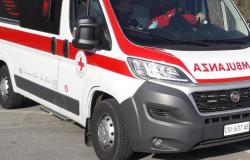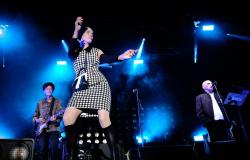She never stops smiling, Giulia. Every laugh shakes the mass of curly hair, in the green courtyard of her house in a hamlet of Parma that is already countryside. «I could never live in the city – she says. This is my world”. A world apparently confined to the house where she lives with her family, next to the farmhouse where her grandmother lives.
Only apparently, though. Paralympic champion with a list of 27 international medals, a world record in the 50 meter butterfly in the short course and a world title in the 100 meter breaststroke, with which she will present herself in Paris in September in the XVI Summer Paralympic Games under the banner of the State Police , Giulia Ghiretti lives between planes to catch, races to face, daily training to honor. And then the meetings in schools, which have multiplied in recent years.
Because she has her own story to tell: that of a 16-year-old girl, a promising young athlete, who on a January day in 2010, during her first training session after the Christmas holidays and shortly before the World Championships she was expected to attend, took literally flying on the trampoline, his specialty, lands on his back and shatters a vertebra. Surgery, months of therapy. The certainty that she will never walk again. The wheelchair that becomes her “end of pain” (even if she does not subscribe to this expression, because she has never experienced her chair with wheels as a prison). And then the choice to return to competitive sports. In the pool, however, where she feels free. Since then it has been a crescendo: over 60 Italian titles, a world record, European and world titles, two silvers and a bronze between the Rio and Tokyo Games.
Giulia, your story has also become a book It’s always me (Piemme, 208 pages). When did you think you wanted to write it?
I never wanted to! Andrea convinced me (Del Bue, journalist and friend of Giulia’s heart, co-signed the book with her, ed.). I don’t like to talk about myself. The turning point was with Covid: locked in our homes, we had time.
Last February you have turned 30. What effect did it have on you?
Traumatic. I feel like I haven’t accomplished anything. Of being a little late.
Late? You completed your master’s degree in biomedical engineering at the Polytechnic of Milan, you won dozens of medals in the Olympics and world competitions…
Yes, it’s true. But inside me, my personal, intimate life, I feel late.
For years you have been going around schools to testify that disability does not limit life. What do you like most about meeting children and young people?
I like their spontaneity. They ask me things like: do you go into the water with your wheelchair? Why do you wear pants if you can’t feel your legs? Couldn’t you cut off your legs and get prosthetics? Children do not feel barriers. I try to convey to them the idea that disabled people can do the same things as able-bodied people, in different ways. The important thing is to have the curiosity to know who is different from you, so you are less afraid. Disability is scary, yes, but only because you don’t know it.
The title of your book is “It’s always me”: Giulia, have you really remained the same as you were before the accident?
Yes, and do you know why? Because I haven’t abandoned my dreams. In fact, I’ve made new ones. For me, everything that has happened in these years is a dream: the Olympics, the World Cup, meeting the President of the Republic, presenting Parma’s candidacy as the Italian City of Culture… Sometimes I think: what have I done to deserve all this?
Let’s say you turned strength disability. It’s not a little. Do you think that thanks to your meetings in schools those who listen to you change their gaze?
Yes a bit’. I see that a climate of confidence is being established and it is often the kids who ask me how to behave with those in my situation.
For example, what shouldn’t you do?
Well, the pats on the head, the unsolicited hugs. In general, it’s simple: disabled people should be treated like everyone else. The same. I don’t like them putting me on a pedestal, or glorifying my achievements as a disabled person. Those who tell you: how good, but how do you do it… As for me, I love maintaining my normality.
I have never given up on my dreams
I feel a responsibility towards others
From this wheelchair I can build something
Maybe this is the meaning of what happened to me
After the accident you chose to dedicate yourself to paralympic swimming. Why?
Water is freedom. In the pool for the first time after the accident I had full awareness of my body. Out of the water I’m always leaning on something, my legs weigh a lot but I don’t feel it. In the water nothing matters anymore, the legs obediently follow the movements of the body.
Do you ever feel like you have limits?
The limits are physical. A step, a ladder, for me are objectively just as many limits, because I cannot go beyond them alone. The limits are all outside of me, or in certain mentalities that exclude disabled people. For the rest, rather than limits, I say that there are objectives.
In the book you write that when you dream of yourself, you see yourself standing. What feeling do you have?
It’s difficult to explain: I’m standing, but maybe in a place where there is gravel and I find it difficult to move. It’s an unreal and yet true situation: today with the wheelchair on the gravel I can’t move.
Do you ever think that one day, thanks to advances in science, medicine and technology, you will be able to go back to walk?
When I got hurt they told me that in a decade there would be amazing news. 14 have passed. I use the exoskeleton for physiotherapy, but there is no comparison with the mobility that my wheelchair guarantees me.
In your book you also write that you don’t know how to say I love you, not even to your sister to whom you are very close. How come?
Because I can’t express my feelings. I consider myself a very reserved person, sometimes I can seem cold and distant. But I really like hugs, there are times when I need human warmth. But here, gestures are one thing, words are another.
Love?
I’ve had sentimental stories, but it’s not easy, I realize that disability is scary. I want a love like a movie, but it’s difficult… Then the more you grow, the more demanding you become. I said it at the beginning, didn’t I, that I feel late?
You grew up in the oratory, but then you moved away. What happened?
After the accident I went to Mass and people came around me, surrounded me and I felt uncomfortable. It was their way of making me feel close, but I ended up running away before the service ended. Now for me, being a believer means loving and welcoming others.
At the end of the summer you will participate in the Paris Paralympics, you will arrive as the reigning champion. As you see her?
It will be very difficult. I’m terrified of the two Chinese athletes with whom I will compete, because you don’t know what they do during the year, you don’t know them, they only pop up at the Olympics.
In short, you will swim to defend your title?
Now on paper I have the first time, but I know that some of my opponents are much faster than me. So, no, I don’t feel like I’m being chased but I’m still a chaser.
What did setting your personal best in the 100m breaststroke in the final at a World Championships give you?
An indescribable joy. But not for the record itself, but for the idea of having the possibility of exceeding my limits every time. And then, the adrenaline rush…
Is there a woman who inspires you?
My mum. We are very similar on certain things. Intuition, for example. Understanding the needs of others without them even expressing them. Practicality: always knows what needs to be done. After the accident, at a certain point you said: well, now I’ll sleep for two hours because starting tomorrow there will be a lot of things to do.
How was your adolescence?
It’s as if I hadn’t experienced adolescence. At 16 I had an accident so I had to relearn everything. It was all new.
Did you find meaning in what happened to you?
I actually don’t even wonder. It happened, pure bad luck. The only thing I ask myself is if I can be useful to someone, if this bad luck can bear fruit. If the answer is yes, then perhaps this is the meaning.
You are an athlete, you are a sister, a daughter, an engineer. Many roles together, like each of us. But who is Giulia really?
I’m a girl who loves to challenge her limits. And that she, however, has her own fears, that sometimes she would like to shut the world out and stop. But she feels she has a responsibility towards others. They frequently call me to talk about my life, my experiences and in some cases curiosity arises about what is behind, in everyday life, a person with a disability. It means that they find something beautiful and good in me. It means that I too, from this wheelchair, can build something.






